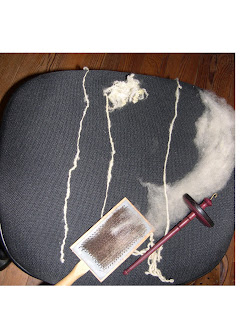Safer Campuses?
© 2007 Joanne Seiff. Please do not publish this or post this on the web without permission
Ten Steps Towards Safer Campuses
Are you scared about your safety at school? What can you do, as an individual, to help make your campus a safer place?
No one can guarantee safety. It’s dangerous to cross the street. However, our country’s campuses are seen as open, safe places to take risks, lively centers of debate and free thought, action and ideals. We shouldn’t have to give up on those values because of incidents like the one at Virginia Tech, no matter how scary they might be. Here are a few steps, linked with easy to remember platitudes, which we can use to make campuses safer:
Follow Up: Seung-Hui Cho, the Virginia Tech shooter, frightened some university faculty enough so that they had him removed from class or referred him to campus security. His parents thought he might commit suicide. He threatened female students on campus. Each of these incidents, on its own, should be enough to warrant follow-up. When something strange happens at your school, don’t be afraid to ask those in charge to follow up. Removing a student from class or contacting security officials is a rare event for instructors in a university setting. After this occurs, one conciliatory meeting with a dean of students or a department head is not enough. A university advisor, a campus counselor, or member of on-campus clergy should be touching base regularly with a student at risk. It’s not just one person’s academic career that’s at stake -- It’s a person’s mental and physical health, and the safety of others.
We’re a Community: If you live on campus, you know that being a student isn’t just about attending class. Participating in an academic community, whether you’re a student, teacher, administrator, or school employee, means reaching out to others. A student is not just a body in Introductory Biology, but a person who might need a home cooked meal, a friendly conversation, or a “Good Morning” when you see them on the street. Some of the best learning experiences happen outside of the classroom. Promoting a web of relationships between students and faculty promotes communication and mentorship. It enables scared students to reach out, and it allows faculty to probe deeper when something is wrong. Communities can work together to help students or faculty at risk.
Each One, Teach One: Take responsibility for your own safety, and that of others. An academic community in which students take responsibility, not just for their own learning, but for their own health, safety, and well-being, will help prepare you best for life outside the ivory tower. Resident Advisors are sometimes considered responsible for those in their dorms, but in the ideal world, all students would be obligated to look out for one another. This is an important way to promote campus safety, unity, and a sense of familiarity and belonging, especially in times of crisis.
It Takes a Village: Learning communities are not just about students and faculty. Administration is important too, but no university could run without its cafeteria workers, janitors and grounds crew. On campus banks, restaurants, shops and other resources all are staffed by employees. Ask that your university brief every single person on campus and remind them of how to build and maintain safe community environments. It’s not only about paying employees a living wage—it’s also about including them in the institution’s academic mission, and helping them to create more than clean classrooms. A janitor at Virginia Tech faced the gunman and offered National Public Radio reporters an eye-witness account of the shooter early on. Every person counts.
Set Limits: College is sometimes seen as a chance to explore every angle of new-found freedom…sex, drinking and drugs are often the buzz words we hear about. What about violence? Students deserve safe environments. Universities must set clear boundaries that insist that students are there to learn in peace. This should be part of the contract when a student arrives on campus, and repeated frequently. University buildings at the University of North Carolina-Chapel Hill all remind students that carrying weapons on campus is not allowed. Perhaps that seems obvious to some, but the reminder might have been another helpful barrier in avoiding a campus shooting.
Enforce Standards: Ever seen a big cover-up when an athlete on campus breaks the rules? Universities often sweep student infractions under a large campus rug. When anyone breaks the rules—threatens others, creates a disturbance in a classroom, or causes violence, their actions deserve publicity. Universities need to be honest, open, and specific about what’s wrong, and why it isn’t allowed. You, as a student, need to remember what the penalties are, and know they’ll be applied uniformly. When students hear about on and off-campus penalties for wrong-doing, you’ll be reminded of what those campus limits are, and why they are there.
Encourage Cooperation: Competition is rough on some campuses, with myriad examples of students stealing other students’ work or committing other crimes against learning. Yes, the world is a competitive place, but universities do students no favor by encouraging them to compete in an unhealthy way. It’s the obligation of teachers to encourage cooperation (but not cheating!) whenever possible. Many students will collaborate and work in large teams in the work world. Look for classes in which the professors encourage productive collaboration in the classroom. This cooperation will not only create unlikely alliances and friendships with people you’d never normally meet, but also teach you valuable skills. Meanwhile, meeting students from all walks of life will you develop respect and compassion for people who aren’t like you.
Self-Defense: Many universities encourage students to take Physical Education. Why not sign up self-defense as part of your education? One hopes that you’ll never need those skills, but if you should ever need strength in adversity, perhaps a self-defense class might be a good first step.
Law Enforcement: When was the last time on-campus police got any respect? Develop relationships between campus security and everyone else on campus. Invite security to talk at your dorm meetings, in classrooms, and at campus events. Make sure your police force is social and open to friendly encounters with the rest of the campus community. Encourage your school’s administration to strengthen campus police force training and connections with local, state, and federal law enforcement.
Make Peace: We can all be positive agents of change. Do you see arguments on campus? Reach out. Offer to buy somebody a cup of coffee and talk it out. Step in to help with conflict. Be a busy body, in the best sense of the word. If somebody had reached Seung-Hui Cho in time, how many of those 33 deaths at Virginia Tech could have been prevented? How many of those people would still be alive today?
Joanne Seiff is a writer and knitwear designer. She’s married to a professor and worked in the past for Duke University, Erie County Community College and Western Kentucky University. She’s got degrees from Cornell University, George Washington University, and the University of North Carolina-Chapel Hill. Read more of her work at http://www.joanneseiff.com or email her: joanneATjoanneseiff.com
© 2007 Joanne Seiff. Please do not publish this or post this on the web without permission.






































